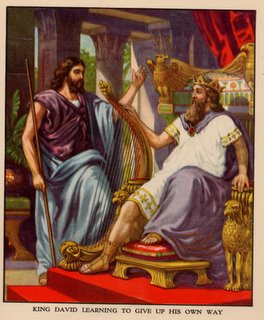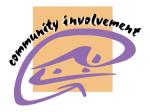Good Day. For 25 years, I have written and sent out to over 300 people, a Christmas poem. Some have been better than others. Over the last few years, I discovered that I had somewhat of a forum to pass on ideas, so I began to take care not to waste the opportunity given me. The poem below is this years. In later postings, I'll print some previous years' poem. Hope this is meaningful to you."Wisdom Comes" By John R. Wible December 25, 2005 Twenty-Fifth Annual Christmas Poem
[Enter Chorus:] Turns the world again, and East becomes West, Night becomes Day, the waters still and all is well.
"All is well." So it was in Sophie's world that faithful Christmas until the winds of change began to whisper just now perceptibly, "Wisdom comes." A Christmas party perfect - perfect like Sophie's world. Sophie, the Woman of Substance, well liked, well served, and well placed. Her husband, owner of the mill ruled by her son. "Her," as in, "good things adhere to her," and a dozen other synonyms and their relatives - "adhered," like chalk adheres to a blackboard." But blackboards have erasers, and her board was about to be wiped clean, clean and black.
All opened perfect presents, Sophie's the most so. One, two. No, three. Three presents given to Sophie: from her friends, an onyx peacock broach whose tail feathers were topaz and sapphires alternating like winking eyes - a truly wonderful piece; from her loving husband, and trusted son, a gold ring - a ring without end - or so it would seem; and from her mother and father, a ruby-circled hand mirror in which she could see herself - circled by rubies - and rightfully so for she was lovely. Rightly so - or so it would seem. A perfect Christmas party - and then.
[Enter Chorus:] Turns the world again, and East becomes West, Night becomes Day, the waters still and all is well.
Bell's messenger called, "turn the switch on now, take a look." There was concerned compliance from Sophie as the "eye on the world" saw a fire at the mill, live and in colour. It's lost, it's all lost. But, who paid the premiums and why not? The trusted son was not so trustworthy as all thought. It's lost as well. All - is - lost.
"Can I trust no one, anguished Sophie?" "No one," confirmed her husband. "No one and no thing can be trusted again. Give him up to the men-at-arms and the broach and the ring to the creditors." [No thing can be kept long, either.] "But I still have the mirror." But does she? Does it still reflect perfection circled with rubies - or does it show the real Sophie?
[Nursing notes:] Sophie does not eat or sleep. She stares. Hours become days - days become weeks. And the ruby-circled cheeks lose their hue. Ruby becomes pallid . . . pallid becomes jaundice. Fifteen ips become seven and a half . . . to three and a quarter and the wheels ... slow ... down. Others care for her at State expense.
"Give up and die," is all her husband can now offer. "All the piety is wasted, empty, hollow. "But I'll never give up," says Sophie. "I know some savior will come. This is not my destiny. I will once again rise from this bed." - A noble thought, but will it persist? Again her husband offers, "give up and die." And this time, Sophie wonders, should I really live? Should I have even been born?" And she utters for the n-teenth time, "why me?"
[Enter Sophie's sorority sisters: Olive, Beth and Jimmie Nell. Companions, compatriots, comforters. Comforters? Yes, comforters - wise women of the world, come to bring wisdom. Shock saddens them. Words fail. They can bring no comfort - they bring only a pot of bronze mums.]
After a time, Sister Olive, the Old One, offers a helpful platitude: "Perhaps God is judging you because of some errant way, some time when you failed Him - in a small way, of course, Sister Sophie." ("However, it must have been a great thing," she thought to herself.) "In a small way - really," mocked Sophie. "And have you seen such a thing in me? You've known me since we were girls. Is my destiny really dependent upon my conduct? I find no fault in me. Yet, why are there small circles under my eyes and a large one on my back?"
Ever the Critical One, Sister Beth adds, that son of yours, there's the bringer of the blame that now lies at the foot of this sick-bed. How far did that apple fall from its tree? This points to you, Sister Sophie. Agree with me and God will be pleased.
"Sister, if you are right, then I - we - are all bound to fail. Is there fairness in that? Who will answer? Will you, Beth - will you, God? Lastly, the Cheerie One, Sister Jimmie Nell weighs in. "We all know your innate goodness, appeal to that, you can overcome if you desire it enough."
[And having delivered the bronze mums to the bedside table, the Three "Little Sisters of Charity" go back to their lives - sad. Sad for Sister Sophie - but glad it wasn't them.]
The room does not speak. The mums have said quite enough. In the quiet, Sophie thought, "God, yes, He's come up a lot in this. God - WHERE ARE YOU, GOD? Is it true all the "talking mums" said? Did I fail You, God? Am I to blame for another? Can I will my way out of this calamity? Tell me, God." - But God was silent. He wasn't on-call that night.
[Enter Chorus:] Turns the world again, and East becomes West, Night becomes Day, the waters still and all is well.
Rev. Jim, the Chaplain, has seen this repeat itself a hundred times before - maybe a thousand. He's heard the question, it's always the same question - why me, Lord? He's not the real comforter - but he knows Him. And he replaces the bronze mums with an Easter Lily. "Let's talk, Rev. Jim. I think it's time for some answers. Don't I deserve some answers - straight answers?
"Why you," interrupted Rev. Jim, "that's what you wanted to ask, wasn't it? Did you fail God, directly or indirectly, so He's mad at you? Did He set you up to fail? Does He do this with every woman under the sun? Where is the fairness in this? Can you will yourself out of this? Can you succeed by the ‘power of positive thinking?'- So many questions - not novel ones - but so many."Rev. Jim took a breath.
"Look under the Easter lily and tell me what you see." Sophie pondered a minute, this was an odd way for a chaplain to bring comfort. But she looked and saw - "nothing." "Nothing," replied Rev. Jim, "look again, this time with you mind's eye." Still nothing. "Then one more time, look through the windows of you spirit," urged Rev. Jim in a voice as calm as Lake Genesseret at noonday after the storm - yet, as powerful.
"I see three presents wrapped as though under the Christmas tree at that perfect party so long ago," marveled Sophie, wondering where they had come from and why she had not seen them before. "And, for whom are they destined ," asked Rev. Jim in the voice that knew the answer but asked any way. Sophie replied, "there is no name or label, are they for me?" "Are they," repeated Rev. Jim? "Who owns the wild hare in the wood?" "She who takes him," answered back Sophie." "Then they are for she who takes them?" Rev. Jim nodded. And she took them.
[Enter Chorus:] Turns the world again, and East becomes West, Night becomes Day, the waters still and all is well.
Sophie reached to open the first present, in elegant gold wrapping and ribbon fit for a King. But, it was already opened. "I don't understand," she said. And Rev. Jim replied, "it is the gift of life and the gift of ‘why?' You are alive - still alive, and you have already asked ‘why.'" So open another.
The second present was a pot-bellied clay jar with a long neck and crocked handle. It looked as though it could have come from Iran a long time ago. As Sophie touched the jar, it began to glow with an iridescence that seemed almost white-hot. Nevertheless, it was pleasantly cool to the touch. Sophie grasped the bottle and billows of blue smoke began to erupt as though from a volcano – only blue – blue like the fringe on the rabbi's prayer shawl. And the smoke began to fill the room with itself wrapped in a fragrance that reminded Sophie of sandalwood.
Soon, Sophie felt within the smoke a presence unlike any she had ever felt before. She thought herself the High Priest on the Day of Atonement in Solomon's Temple and she knew that she was in the very presence of God.
"What do you feel, Sophie," asked Rev. Jim after he let her revel in this presence a moment – a moment taken out of time? "I feel as though I have reached out and touched the Face of God," she replied in a voice of calm amazement. "And what do you want to ask God now," pressed Rev. Jim? "I ... I must have had some question," stammered Sophie, "but it seems that I have forgotten it. It must not have been important." "That's right," reassured Rev. Jim, "it wasn't important. In the presence of God, ‘why me' is lost in the ‘who art thou, Lord.'"
"Sophie," began Rev. Jim, all your life, you have lived in the presence of Sophie and even amid all that which seemed ‘perfect,' you've been filled with wondering and doubt…" "But, picked up Sophie," in the white-hot presence of God all those doubts vanish into the blue smoke yielding the smell of sandalwood, until all that's left is the ‘peace, be still.'"
One last present – one more for Sophie, a new Sophie with a new perspective - a Heavenly one. One more present that seemed almost anticlimactic. After all, when you've been in the presence of God and seen things through His eyes, what else is really that important? Even so, though she now saw things differently, she knew that she must go on and live out that perspective in her life. In fact, she wanted to.
The last present was an inviting-looking amber-coloured liquid in a translucent box with no perceptible way to open it. "Break it open and dip your fingers in it and rub them together," coaxed Rev. Jim. "It is the Balm of Gilead that ‘makes the wounded whole." She did – and it did. Her finger tips began to glow and as they glowed, every ounce of pain and hurt began to be absorbed by the healing oil. Gone was the sadness that had held her prisoner. Gone, too the were feelings of loss and guilt, soothed away in the amber ooze.
And so it was on Christmas, that Sophie was healed and restored – healed in body, mind and spirit and restored in perspective and restored in the longings of her heart. Wisdom came to Sophie that Christmas – wisdom in viewing life through the eyes of God and then living out lifer in the new perspective. Sophie realized that she no longer had to ask "why," just "Who."
[Enter Chorus:] Turns the world again, and East becomes West, Night becomes Day, the waters still and all is well. [Exeunt all.]
Legal Notice: Material is the property of John R. Wible. All rights reserved
________________
This is 25 years of Christmas poems. May you have the happiest of Christmases this year and may wisdom come to you. Contact me at . John R. Wible
 “Starting Now” asks the question: “when God calls will you take the call or screen it?”
“Starting Now” asks the question: “when God calls will you take the call or screen it?” “Paying the Price to Serve God” reminds us that service is not all glorious pep rallies with Cliff Barrows and the 5,000 voice Crusade Choir singing “Just As I Am” while all the busses wait just for you. There ultimately is a price to pay – it costs us something – it ain’t free. Are we willing to pay that price?
“Paying the Price to Serve God” reminds us that service is not all glorious pep rallies with Cliff Barrows and the 5,000 voice Crusade Choir singing “Just As I Am” while all the busses wait just for you. There ultimately is a price to pay – it costs us something – it ain’t free. Are we willing to pay that price? “Dealing with Doubt” has nothing to do with Monty Hall, it is about (drum rollllll)……….. doubt. What about when God’s call doesn’t seem clear or we doubt we have heard Him right “You mean you want me to do what?”
“Dealing with Doubt” has nothing to do with Monty Hall, it is about (drum rollllll)……….. doubt. What about when God’s call doesn’t seem clear or we doubt we have heard Him right “You mean you want me to do what?” “Doing My Part” ask us to put all these together and determine exactly what is my part. Then, of course, as Henry Blackaby would say, it leads us to a “crisis of faith and belief” when it concludes with, “. . . so OK, are you going to do it or not?”
“Doing My Part” ask us to put all these together and determine exactly what is my part. Then, of course, as Henry Blackaby would say, it leads us to a “crisis of faith and belief” when it concludes with, “. . . so OK, are you going to do it or not?”

















